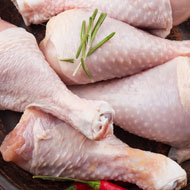Campylobacter found in 70 per cent of supermarket chicken

Campylobacter is the most common form of food poisoning in the UK, affecting an estimated 280,000 people a year.
Seventy per cent of supermarket chickens have tested positive for the presence of campylobacter, results published from a survey by the Food Standards Agency (FSA) have revealed.
Tackling campylobacter is the FSA's number one food safety priority and it is spearheading a campaign to bring together the whole food chain to tackle the problem.
A 12-month survey, running from February 2014 to February 2015, will test 4,000 samples of whole chickens bought from UK retail outlets and smaller independent stores and butchers.
So far, almost half of the samples have been tested, and cumulative results from the first two quarters reveal:
• 18 per cent of chickens tested positive for campylobacter above the highest level of contamination
• 70 per cent of chickens tested positive for the presence of campylobacter
• Six per cent of packaging tested positive for the presence of campylobacter with only one sample at the highest level of contamination
Campylobacter is the most common form of food poisoning in the UK, affecting an estimated 280,000 people a year.
Steve Wearne, FSA director of policy, said: "These results show that the food industry, especially retailers, need to do more to reduce the amount of campylobacter on fresh chickens. Although we are only half-way through the survey, 18 per cent of birds tested had campylobacter over 1,000 cfu/g, the highest level of contamination, and more than 70 per cent of birds had some campylobacter on them. This shows there is a long way to go before consumers are protected from this bug.
"If chicken is cooked thoroughly and preparation guidelines are properly followed, the risk to the public is extremely low.
"There are signs that some retailers are starting to step up to their responsibilities. When more do, we will see the sustained improvements that will help prevent many of their customers getting ill."
A summary of the results by retailer can be found at www.food.gov.uk



 The veterinary mental health charity Vetlife is inviting the veterinary community to join it for a sponsored cold-water dip.
The veterinary mental health charity Vetlife is inviting the veterinary community to join it for a sponsored cold-water dip.